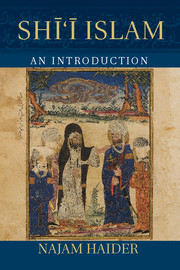Book contents
- Frontmatter
- Dedication
- Contents
- List of Tables and Maps
- Acknowledgments
- Note on the Cover Image
- A Note on Transliteration and Dating
- Maps
- Introduction
- Section 1 Theology
- 1 ‘Adl (Rational Divine Justice)
- 2 Imāmate (Legitimate Leadership)
- Section 2 Origins
- Section 3 Constructing Shī‘ism
- Section 4 Shī‘ism in the Modern World
- Appendix Verses Mentioned in the Argument from Qur’ānic Expectations in Chapter 3
- Index
- References
2 - Imāmate (Legitimate Leadership)
Published online by Cambridge University Press: 05 August 2014
- Frontmatter
- Dedication
- Contents
- List of Tables and Maps
- Acknowledgments
- Note on the Cover Image
- A Note on Transliteration and Dating
- Maps
- Introduction
- Section 1 Theology
- 1 ‘Adl (Rational Divine Justice)
- 2 Imāmate (Legitimate Leadership)
- Section 2 Origins
- Section 3 Constructing Shī‘ism
- Section 4 Shī‘ism in the Modern World
- Appendix Verses Mentioned in the Argument from Qur’ānic Expectations in Chapter 3
- Index
- References
Summary
And (remember) when his Lord tried Ibrāhīm [Abraham] with [His] commands, and he fulfilled them, He said: “Lo! I have appointed you a leader (imām) for mankind.” [Ibrāhīm] said: “And of my offspring?” He said: “My covenant does not include wrongdoers.”
(Q2:124)And We bestowed upon him Isḥāq (Isaac) and Ya‘qūb (Jacob) as a grandson. Each of them We made righteous. And We made them leaders (imāms) who guide by Our command, and We inspired in them the doing of good deeds and the right establishment of worship and the giving of alms, and they were worshippers of Us.
(Q21:72–73)Every Shī‘ī group holds that ‘Alī was the legitimate successor to the Prophet based on either a formal or an informal designation. According to the Shī‘a, ‘Alī was not merely the rightful political head of the community but also wielded spiritual authority. He was an Imām as conceived of in the Qur’ānic verses that open this chapter, guaranteeing that the community would not be led astray and providing divinely inspired leadership. As mentioned in Chapter 1, rational divine justice supplies both a knowledge-centered and a politically centered justification for the necessity of the Imāmate. In the postprophetic era (Muḥammad being the last prophet), Imāms are designated by God to guide the Muslim community as both interpreters/preservers of revelation and political leaders. Although the Imām is the singular representative of legitimate authority, the nature of this authority (political versus religious) is contested among the different Shī‘ī communities.
This chapter focuses on various aspects of the institution of the Imāmate, arguably the most distinctive element of Shī‘ism. The organization of the chapter is thematic. The first section focuses on the spiritual dimensions of the Imāmate that are common to nearly every major Shī‘ī group. Specifically, it explores the concept of walāya, a notoriously difficult word to translate but one that broadly connotes the charismatic bond between the Shī‘a and the ahl al-bayt (lit. people of the house, but often simply referred to as the family of the Prophet). The second section examines the political dimensions of the Imāmate, such as the qualifications of an Imām and the scope of his authority. These issues are a primary means of differentiating between Shī‘ī groups.
- Type
- Chapter
- Information
- Shi'i IslamAn Introduction, pp. 31 - 50Publisher: Cambridge University PressPrint publication year: 2014

